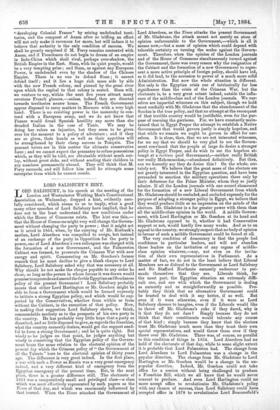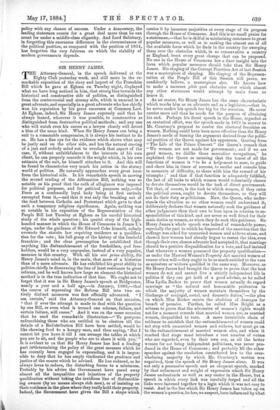LORD SALISBURY'S HINT.
T4ORD i SALISBURY, in h speech at the meeting of the London and Westminster Working Men's Constitutional Association on Wednesday, dropped a hint, evidently care- fully considered, which seems to us to imply, what a good many other speeches of Lord Salisbury have implied, that he does not in the least understand the new conditions under which the House of Commons exists. The hint was this,— that the House of Commons might very well change the Govern- ment without changing the party in power ; that it might act as it acted in 1854, when, by the carrying of Mr. Roebuck's motion, Lord Aberdeen was compelled to resign, but instead of an exchange of the party in Opposition for the party in -power, one of Lord Aberdeen's own colleagues was charged with the formation of a new Government, and the Palmerston Cabinet was formed, to prosecute the Crimean War with new energy and spirit. Commenting on Mr. Goschen's former remark that he must decline to give a blank cheque to Lord Salisbury, Lord Salisbury asked why that was necessary at all. Why should he not make the cheque payable to any order he chose, so long as the person in whose favour it was drawn would promise to supersede and amend the feeble Egyptian and Soudanese policy of the present Goverment Lord Salisbury probably means that either Lord Hartington or Mr. Goschen might be able to form a Government which would be formed expressly to initiate a strong Egyptian policy, and which would be sup- ported by the Conservatives, whether from within or from without the Cabinet, in the execution of that policy. Now, in making that suggestion Lord Salisbury shows, we think, commendable modesty as to the prospects of his own party in the country. He has probably very little hope that a party so disunited, and so little disposed to give, as regards the franchise, what the country earnestly desires, would get the support need- ful to form a strong Government ; and he is quite right. But wisely as he judges on that point, he judges anything but wisely in conceiving that the Egyptian policy of the Govern- ment bears the same relation to the electoral opinion of the present day which the Crimean policy of "the Government of all the Talents" bore to the electoral opinion of thirty years ago. The difference is very great indeed. In the first place, a war with such a Power as. Russia was a very great emergency indeed, and a very different kind of emergency from the Egyptian emergency of the present time. But, in the next place, there is a greater difference still. The electorate of 1854 was a comparatively small and privileged class—a class which was most effectively represented by such papers as the Tunes of that day, and which was enormously influenced by that journal. When the Times attacked the Government of
Lord Aberdeen, as the Times attacks the present Government of Mr. Gladstone, tbe attack meant not merely an atom of opinion unfavourable to the Government,—which is all it means now,—but a mass of opinion which could depend with tolerable certainty on turning the scales against the Govern- ment. Therefore, when the opinion of the London journals and of the House of Commons simultaneously turned against the Government, there was every reason why the resignation of the Cabinet and the formation of a new Government to repre- sent a more active principle of foreign policy, should have led, as it did lead, to the accession to power of a much more solid Administration. But now the whole situation is different. Not only is the Egyptian crisis one of intrinsically far less significance than the crisis of the Crimean War, but the electorate is, to a very great extent indeed, outside the influ- ence of the middle-class and, of the London journals. We our- selves are impartial witnesses on this subject, though we hold most cordially with Mr. Gladstone that the abandonment of the Soudan is the true policy, and that no attempt at the reconquest of that terrible country would be justifiable, even for the pur- pose of rescuing the garrisons. For, we have constantly main- tained that in Egypt Proper the attempt to establish a Native Government that would govern justly is simply hopeless, and that while we remain we ought to govern in effect for our- selves. It is clear, then, that we are not interested witnesses, for we say that we should be very glad to see the Govern- ment convinced that the people at large do desire a stronger policy in Egypt Proper, and do wish to see the hopeless at- tempt at a tertium quid Government,—neither really British' nor really Mahommedan,—abandoned definitively. But then, can we honestly say they do desire this? On the whole, cer- tainly not. We believe that the great mass of the electors are not greatly interested in the Egyptian question, and have been persuaded to sanction the military operations there only by their deference for the Prime Minister, whom they so justly admire. If all the London journals with one accord clamoured for the formation of a new Liberal Government from which Mr. Gladstone should be excluded, and excluded expressly for the purpose of adopting a stronger policy in Egypt, we believe that they would produce little or no impression on the minds of the electors. Mr. Gladstone is a far greater power with them than all the' middle-class opinion in the world. A middle Govern- ment, with Lord Hartington or Mr. Goschen at its head and Mr. Gladstone opposed to it, whether it had Conservative support or not, would hardly live many weeks. And as to an appeal to the country, we strongly suspect that no body of opinion in favour of such a middle Government could be found at all.
The very condition of democracy is that the people feel confidence in particular leaders, and will not abandon those leaders on the invitation of any organs of middle- class opinion whatever,—nay, not even on the invita- tion of their own representatives in Parliament. As a matter of fact, we do not in the least believe that Liberal Members are as disloyal to the Government as Lord Salisbury and Sir Stafford Northcote earnestly endeavour to per- suade themselves that they are. Liberals think, for the most part, the Egyptian situation an extremely diffi- cult one, and one with which the Government is dealing as earnestly and as straightforwardly as possible. Pro- bably they think that no alternative Government could be trusted to deal with it any better, if so welL But even if it were otherwise, even if it were as Lord Salisbury chooses to imagine, even if the Liberals would like to throw off Mr. Gladstone's yoke if they dared, why is it that they do not dare ? Simply because they do not think that their constituents would tolerate any course of that kind ; simply because they know that the electors trust Mr. Gladstone much more than they trust their own special representatives, and would throw them over if they threw over Mr. Gladstone. There was, of course, no parallel to this condition of things in 1854. Lord Aberdeen had no hold of the electorate of that day, while to some slight extent it is probable that Lord Palmerston had. The change from Lord Aberdeen to Lord Palmerston was a change in the popular direction. The change from Mr. Gladstone to Lord Hartington or Mr. Goschen would be a change in the un- popular direction. Indeed, Mr. Goschen could not take office for a session without being challenged to produce a Franchise Bill, which we all know that he would never consent to produce. And even Lord Hartington could no more accept office to revolutionise Mr. Gladstone's policy with any chance of success, than Lord Salisbury could have accepted office in 1878 to revolutionise Lord Beaconsfield's
policy with any chance of success. Under a democracy, the leading statesman counts for a great deal more than he can count for under a middle-class oligarehy. And Lord Salisbury, in forgetting this enormous difference in the circumstances of the political position, as compared with the position of 1854, has forgotten the very fulcrum on which the stability of modern governments depends.



































 Previous page
Previous page